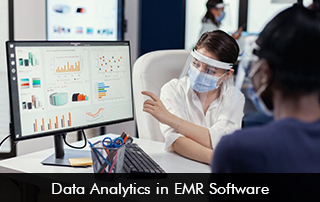Data analytics within Electronic Medical Records (EMR) Software is changing the very model of health and medical care by using big data to meaningfully conclude the treatment of a large number of patients. These tools help healthcare organizations make informed decisions regarding patient treatment, practice efficiency, and effectiveness of results.
Benefits of Leveraging Data Analytics in EMR Software
Common advantages of data analytics in EHR software include pattern recognition in patient data. For the providers, it allows them to monitor patterns in chronic diseases, anticipate patient outcomes, and identify risks. For instance, having data on patients with diabetes, clinicians can actively look for signs of deterioration in the condition. Such as increased blood sugar levels, or more hospital visits, and address them early.
EMR Software tools also increase operational efficiency achieved through data. Performance levels can be assessed in individual clinics, control patient traffic, and determine resource utilization. For example, through the examination of appointment schedules, hospitals can decrease the waiting time for patients and enhance employees’ productivity. This results in enhanced patient care, patient satisfaction involving the healthcare provider, as well as enhanced staff performance involving healthcare delivery.
Feedback and performance data of clinics can be collected using the Electronic Health Records Software analytics tools to analyze the satisfaction levels of the patients amongst other things. This assists in the delivery of high-quality care in healthcare facilities while at the same time looking at areas of potential use.
Key EMR Software Data Analytics Tools
- Predictive Analysis – This tool helps to predict patient outcomes and treatment success.
- Population Health Management – Empowers providers to effectively manage large groups of population with the same conditions. These robust solutions can help boost the health outcomes of individuals.
- Clinical Decision Support – These offer evidence-based guidelines necessary to support the clinician’s decision-making process.
Moving Ahead
Incorporating data analytics into EHR Software is beneficial for healthcare management as they can implement these methods in improving care delivery, and the flow in this profession. Therefore, making healthcare cheaper, and more efficient.







